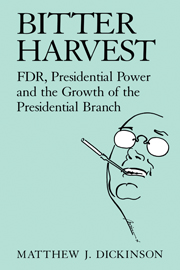Book contents
- Frontmatter
- Contents
- Preface and acknowledgments
- Introduction: The fruits of his labor? FDR and the growth of the presidential branch
- Part I Concepts and controversies
- Part II From cabinet to presidential government, 1933–9
- Part III Testing Roosevelt's staff system: The war years, 1939–45
- 4 Economic mobilization and World War II
- 5 Managing war production
- 6 FDR and the national security bureaucracy
- 7 The commander in chief
- Part IV Lessons and considerations
- References
- Indexes
6 - FDR and the national security bureaucracy
Published online by Cambridge University Press: 21 January 2010
- Frontmatter
- Contents
- Preface and acknowledgments
- Introduction: The fruits of his labor? FDR and the growth of the presidential branch
- Part I Concepts and controversies
- Part II From cabinet to presidential government, 1933–9
- Part III Testing Roosevelt's staff system: The war years, 1939–45
- 4 Economic mobilization and World War II
- 5 Managing war production
- 6 FDR and the national security bureaucracy
- 7 The commander in chief
- Part IV Lessons and considerations
- References
- Indexes
Summary
The most intense criticisms of the presidential branch in the post- Roosevelt era are directed toward the national security staff. When institutionalizing a national security bureaucracy, critics charge, presidents are tempted to obtain foreign policy objectives by circumventing domestic political constraints, thus laying the groundwork for an “imperial Presidency.” The long-term impact, they claim, is an erosion not just of the presidents' national security bargaining influence, but of the constitutional system of checks and balances more generally.
Charges of presidential “imperialism” are not new, of course; recall that FDR's 1937 reorganization plan was characterized by some as a “dictator bill.” However, neither the Brownlow Report nor the legislation it spawned mentions a national security council or staff. Indeed, as this chapter tries to demonstrate, FDR's administrative instincts, as embodied by the Brownlow Report, precluded the development of both. In the words of former Brownlow Committee research assistant James Fesler: “The charge that the Brownlow Committee set in train the development of ‘the imperial presidency’ can only be advanced by those who have not read the Committee's report.”
In fact, the National Security Council's (NSC) origins are traced to Congress' postwar rejection of FDR's wartime administrative strategy. As Mark Lowenthal points out, Roosevelt's seemingly ad hoc management approach was judged too personalized and thus dangerously antiquated in a nuclear weapons-dominated Cold War era:
The World War II system had largely reflected the preferred working methods of President Roosevelt, who maintained central control by establishing numerous satrapies.
- Type
- Chapter
- Information
- Bitter HarvestFDR, Presidential Power and the Growth of the Presidential Branch, pp. 164 - 182Publisher: Cambridge University PressPrint publication year: 1996



